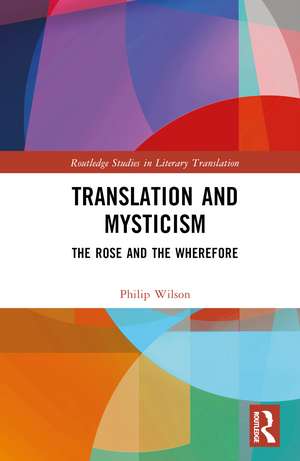Translation and Mysticism: The Rose and the Wherefore: Routledge Studies in Literary Translation
Autor Philip Wilsonen Limba Engleză Hardback – 27 mai 2024
The volume represents the first sustained act of attention to the interdisciplinary crossover of these two fields, taking a Wittgensteinian approach to language, and investigates how mystics and their translators manage to write about what cannot be written about. Three questions are addressed overall: how mysticism can be used to conceptualise translation; the issues that mysticism raises for translation theory and practice; and how mystical texts have been and might be translated. Walter Benjamin’s ‘The Translator’s Task’ is considered in detail as a controversial example of dialogue. Translation examples are given in a range of languages, and six major case studies are provided, including a close reading of Exodus and an analysis of a recent radical translation of Lucretius.
This book will be of interest to students and researchers in translation studies, mysticism studies, theology and literary translation, as well as practising translators.
Preț: 1003.30 lei
Preț vechi: 1223.53 lei
-18% Nou
Puncte Express: 1505
Preț estimativ în valută:
192.00€ • 208.49$ • 161.28£
192.00€ • 208.49$ • 161.28£
Carte tipărită la comandă
Livrare economică 22 aprilie-06 mai
Livrare express 15-21 martie pentru 34.72 lei
Preluare comenzi: 021 569.72.76
Specificații
ISBN-13: 9781032182414
ISBN-10: 1032182415
Pagini: 204
Dimensiuni: 152 x 229 x 19 mm
Greutate: 0.54 kg
Ediția:1
Editura: Taylor & Francis
Colecția Routledge
Seria Routledge Studies in Literary Translation
Locul publicării:Oxford, United Kingdom
ISBN-10: 1032182415
Pagini: 204
Dimensiuni: 152 x 229 x 19 mm
Greutate: 0.54 kg
Ediția:1
Editura: Taylor & Francis
Colecția Routledge
Seria Routledge Studies in Literary Translation
Locul publicării:Oxford, United Kingdom
Public țintă
PostgraduateCuprins
Prologue: Gold and Crystal
1. Becoming Present
1.1 Translation and Mysticism
1.2 The Ineffable
1.3 Case study: Reading Mystical Texts for Translation
2. Eternity
2.1 Problem or Mystery?
2.2 Grammar
2.3 Case study: Moses and the Burning Bush
3. The Sounding of the Song
3.1 Translation and Gnosis
3.2 The Translator and the Task
3.3 Case study: Friedrich Hölderlin and Sophocles
4. Light from Darkness
4.1 Discovery, Construction and Declaration
4.2 Translation as Attention
4.3 Case study: Willis Barnstone and John of the Cross
5. Becoming the Script
5.1 Untranslatability
5.2 Translation as Performance
5.3 Case study: Translating the Spell
6. The Rose and the Wherefore
6.1 Problem and Mystery
6.2 Moving On
6.3 Case study: Emma Gee and Lucretius
Epilogue: Staying in the Sun
1. Becoming Present
1.1 Translation and Mysticism
1.2 The Ineffable
1.3 Case study: Reading Mystical Texts for Translation
2. Eternity
2.1 Problem or Mystery?
2.2 Grammar
2.3 Case study: Moses and the Burning Bush
3. The Sounding of the Song
3.1 Translation and Gnosis
3.2 The Translator and the Task
3.3 Case study: Friedrich Hölderlin and Sophocles
4. Light from Darkness
4.1 Discovery, Construction and Declaration
4.2 Translation as Attention
4.3 Case study: Willis Barnstone and John of the Cross
5. Becoming the Script
5.1 Untranslatability
5.2 Translation as Performance
5.3 Case study: Translating the Spell
6. The Rose and the Wherefore
6.1 Problem and Mystery
6.2 Moving On
6.3 Case study: Emma Gee and Lucretius
Epilogue: Staying in the Sun
Notă biografică
Philip Wilson is Associate Professor of Philosophy and Translation at the University of East Anglia, UK, where he teaches Religion and World Philosophies, Philosophy Meets the Arts and Translation Studies.
Descriere
This book examines the ways in which mysticism can tell us about translation and translation can tell us about mysticism, addressing the ancient but ongoing connections between the art of rendering one text in another language and the art of the ineffable.







